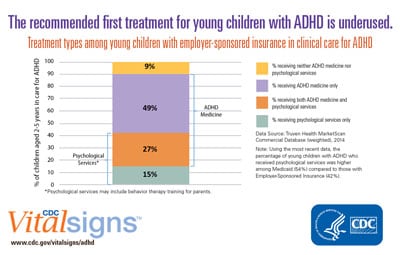Behavior therapy recommended before medicine for young children with ADHD
The recommended first treatment for young children with ADHD is underused. Entire Infographic
Silver Spring, Maryland–(ENEWSPF)–May 3, 2016. More young children 2 to 5 years of age receiving care for attention-deficit/hyperactivity disorder (ADHD) could benefit from psychological services – including the recommended treatment of behavior therapy. The Centers for Disease Control and Prevention’s (CDC) latest Vital Signs report urges healthcare providers to refer parents of young children with ADHD for training in behavior therapy before prescribing medicine to treat the disorder.
ADHD is a biological disorder that causes hyperactivity, impulsiveness, and attention problems. About 2 million of the more than 6 million children with ADHD were diagnosed before age 6. Children diagnosed with ADHD at an early age tend to have the most severe symptoms and benefit from early treatment. The American Academy of Pediatrics recommends that before prescribing medicine to a young child, healthcare providers refer parents to training in behavior therapy. However, according to the Vital Signs report, about 75% of young children being treated for ADHD received medicine, and only about half received any form of psychological services, which might have included behavior therapy.
“Parents may feel overwhelmed with decisions about their child’s treatment for ADHD, but healthcare providers, therapists, and families can all work together to help the child thrive,” said Anne Schuchat, MD (RADM, USPHS), Principal Deputy Director, CDC. “Parents of young children with ADHD may need support, and behavior therapy is an important first step. It has been shown to be as effective as medicine, but without the risk of side effects. We are still learning about the potential unintended effects of long-term use of ADHD medicine on young children. Until we know more, the recommendation is to first refer parents of children under 6 years of age with ADHD for training in behavior therapy before prescribing medicine.”
The report looks at healthcare claims data from at least 5 million young children (2-5 years of age) each year insured by Medicaid (2008-2011) and about 1 million young children insured each year through employer-sponsored insurance (ESI) (2008-2014). In both groups, just over 75% of young children diagnosed with ADHD received ADHD medicine. Only 54% of young children with Medicaid and 45% of young children with ESI (2011) received any form of psychological services annually, which might have included parent training in behavior therapy. The percentage of children with ADHD receiving psychological services has not increased over time.
“Many families will benefit from behavior therapy. However, in some cases medicine may be appropriate,” said Georgina Peacock, MD, director of the Division of Human Development and Disability in CDC’s National Center on Birth Defects and Developmental Disabilities. “When healthcare providers and families know the benefits and risks of all available treatments, they are best prepared to make the most appropriate treatment choice for young children with ADHD.”
Parents do not cause their child’s ADHD, but parents can play a key role in the treatment of ADHD. In behavior therapy, parents are trained by a therapist during eight or more sessions, learning strategies to encourage positive behavior, discourage negative behaviors, improve communication, and strengthen their relationship with their child. When applied, these skills can help the child at school, at home, and in relationships by improving behavior, self-control, and self-esteem. Learning and practicing behavior therapy requires more time, effort, and resources than treating ADHD with medicine, yet research shows that there are lasting benefits making it worth the investment.
In behavior therapy, therapists help parents build skills in guiding their child’s behavior. Skills may include, but are not limited to:
- Positive communication: When parents give children their full attention and reflect their words back to them, your child knows you are listening and care about what he has to say.
- Positive reinforcement: Praise the child when she does something right. The more parents praise a behavior, the more likely it is the child will behave the same way again.
- Structure and discipline: Children do better when their world is predictable. Set up routines and daily schedules to help the child know what to expect each day. Respond to the child’s behavior the same way every time to help her learn more quickly.
CDC message to healthcare providers
CDC is calling on doctors, nurses, and allied health professionals who treat young children with ADHD to support parents by explaining the benefits of behavior therapy and referring parents for training in behavior therapy. This report recommends that healthcare providers:
- Follow clinical guidelines (American Academy of Pediatrics, American Academy of Child and Adolescent Psychiatry) for diagnosis and treatment of ADHD in young children.
- Discuss with parents the benefits of behavior therapy and why they should get training.
- Identify parent training providers in the area and refer parents of young children with ADHD for training in behavior therapy first, before prescribing medicine.
The report highlights missed opportunities for young children with ADHD to benefit from behavior therapy. Increasing referrals and the availability of appropriate services could help many families with young children who have ADHD.
“We recognize that these are not easy treatment decisions for parents to make,” said Dr. Schuchat. “We know that behavior therapy is effective, and the skills parents learn can help the whole family be successful. Building these skills in parents and children empowers families and helps young children with ADHD live up to their full potential.”
For more information, visit www.cdc.gov/ADHD or www.cdc.gov/vitalsigns .
Source: http://www.fda.gov









